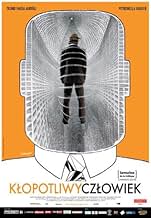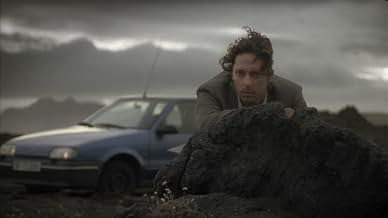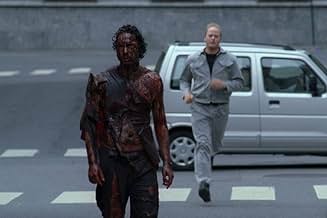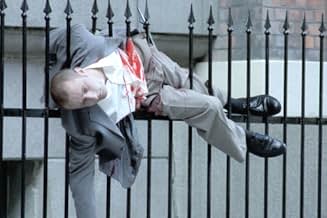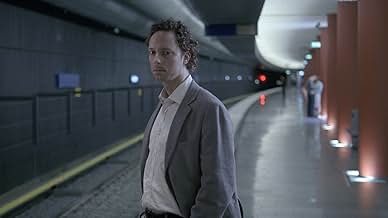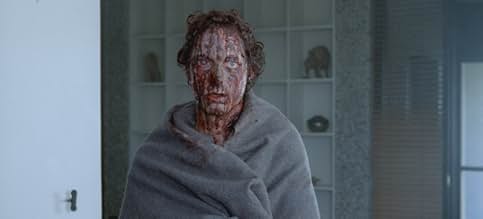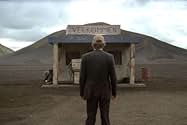AVALIAÇÃO DA IMDb
7,2/10
19 mil
SUA AVALIAÇÃO
Adicionar um enredo no seu idiomaIn a strange city where every person seems content beyond reason a new man arrives in town and stirs up trouble by asking too many questions.In a strange city where every person seems content beyond reason a new man arrives in town and stirs up trouble by asking too many questions.In a strange city where every person seems content beyond reason a new man arrives in town and stirs up trouble by asking too many questions.
- Prêmios
- 26 vitórias e 9 indicações no total
Trond Fausa
- Andreas
- (as Trond Fausa Aurvåg)
Aldun G. Magnaes
- Gutt som kliner
- (as Audun G. Magnæs)
Mette K. Haugen
- Jente som kliner
- (as Mette Karin Haugen)
Gard Petersen
- Forvalter 1
- (as Gard Pedersen)
Benny Glaerum
- Forvalter 2
- (as Benny Glærum)
Avaliações em destaque
I saw this movie yesterday and can't stop thinking about it. I moved to Norway four months ago, and have tried ever since to find the origin of the strange emptiness i felt. When I saw this film I was striken with the brilliant snapshot of this society. Yes, this is all true!!! I too found a great job with a great pay, and I live with my norwegian boyfriend in a nice apartment downtown. But, so far everyone I have met have left me with that tasteless, empty feeling I had never had before - this is what this movie is about. Dinner parties with nothing to say to each other but emotionless comments, long silences, no stress, a creepy calm, and frozen smiles of niceness. This Scandinavian nightmare is perfectly rendered in Den Brysomme mannen. See this movie!!!
I heard an interview with the main actor who said that the film was not intended to be a horror movie but he himself would describe it as mental horror. I strongly subscribe to that.
It is not clear why he travels to this place, but everything there is monotonous, no bright colors, no honest smiles, nothing personal. Everything is ordered and everyone seems to be satisfied living this kind of life. Our "hero" though from the beginning seems to be misplaced and feels it himself.
What makes this film so important and good is the remarkable similarity to life in many large cities or even countries nowadays. You have to function, you are not supposed to let your colleague know your weaknesses, you show off on your wealth, your car, etc., and most of all you lack the true love of life that children have. Naturally, in this film you see neither children nor old people - they simply do not fit in a society of strong workers.
I would recommend this film to everyone - and make sure that this utopia does not come true!
It is not clear why he travels to this place, but everything there is monotonous, no bright colors, no honest smiles, nothing personal. Everything is ordered and everyone seems to be satisfied living this kind of life. Our "hero" though from the beginning seems to be misplaced and feels it himself.
What makes this film so important and good is the remarkable similarity to life in many large cities or even countries nowadays. You have to function, you are not supposed to let your colleague know your weaknesses, you show off on your wealth, your car, etc., and most of all you lack the true love of life that children have. Naturally, in this film you see neither children nor old people - they simply do not fit in a society of strong workers.
I would recommend this film to everyone - and make sure that this utopia does not come true!
What we have here is a film perfect for anyone that participates in the world of post-industrialism: those who sit in their privatized home, earning money by buying and selling sensual-less commodities and perpetuating a system that values little other than the preservation of self.
The beautiful filming (I always appreciate fix 35s and soft boxes) makes it an even stranger place to travel through, both enjoyable to look at but frightening to comprehend (perhaps that's overly dramatic, but its true).
Andreas' journey through his hell is overwhelmingly tragic. His quest is honorable, laudable, and precious. The conclusion is necessary and we are left not sure if he's better off, which is the perfect conclusion.
Breve! Highly recommended to all people who view their world with a critical eye and especially to those who don't (perhaps it will encourage a reflection or two).
The beautiful filming (I always appreciate fix 35s and soft boxes) makes it an even stranger place to travel through, both enjoyable to look at but frightening to comprehend (perhaps that's overly dramatic, but its true).
Andreas' journey through his hell is overwhelmingly tragic. His quest is honorable, laudable, and precious. The conclusion is necessary and we are left not sure if he's better off, which is the perfect conclusion.
Breve! Highly recommended to all people who view their world with a critical eye and especially to those who don't (perhaps it will encourage a reflection or two).
The Bothersome Man (2006)
Of course this is weird. It's a surreal version of dying and heaven (or hell) is a little shack in the middle of nowhere that is a way to get a second chance. At something. Life, maybe.
This is a little like the crop of comic serious surreal movies in the last twenty years where you part laugh and part are gasping in appreciation for the reality invented. I'm thinking "Eternal Sunshine of the Spotless Mind" or "Being John Malkovich" or even "Inception." And at first it's just a terrific experience, going with the flow, which is understated in broad expanses of deadpan landscape and people alike. Eventually you adjust to the newness and want a thread of meaning or something to carry it along.
And this mostly succeeds most of the time. Which is not quite like a brilliant knock you over film. Jump in and wallow with the main character, who seems to have some kind of free will but within an invisible restraint. I mean, taking a ride back to life for some kind of reappraisal, even if you know it's all a mirage, means maybe being radical and not a bit submissive.
Not for this Norwegian. The humor comes and goes, the logic certainly goes more than comes, but the mood, the charm and ease of all the characters is enjoyable, almost heavenly, in a weird not quite coincidental way. I would check this out. I know a lot of people will get bored in the first few minutes because the wry dry humor, the lack of dialog, and even the lack of anything quite happening will drive them batty. But you know if you're not like that, and can get into a "Paris Texas" or "Dead Man" or lightweight Ingmar Bergman sensibility. Try it. I liked it a lot, even if I got a bit restless by the last third.
Of course this is weird. It's a surreal version of dying and heaven (or hell) is a little shack in the middle of nowhere that is a way to get a second chance. At something. Life, maybe.
This is a little like the crop of comic serious surreal movies in the last twenty years where you part laugh and part are gasping in appreciation for the reality invented. I'm thinking "Eternal Sunshine of the Spotless Mind" or "Being John Malkovich" or even "Inception." And at first it's just a terrific experience, going with the flow, which is understated in broad expanses of deadpan landscape and people alike. Eventually you adjust to the newness and want a thread of meaning or something to carry it along.
And this mostly succeeds most of the time. Which is not quite like a brilliant knock you over film. Jump in and wallow with the main character, who seems to have some kind of free will but within an invisible restraint. I mean, taking a ride back to life for some kind of reappraisal, even if you know it's all a mirage, means maybe being radical and not a bit submissive.
Not for this Norwegian. The humor comes and goes, the logic certainly goes more than comes, but the mood, the charm and ease of all the characters is enjoyable, almost heavenly, in a weird not quite coincidental way. I would check this out. I know a lot of people will get bored in the first few minutes because the wry dry humor, the lack of dialog, and even the lack of anything quite happening will drive them batty. But you know if you're not like that, and can get into a "Paris Texas" or "Dead Man" or lightweight Ingmar Bergman sensibility. Try it. I liked it a lot, even if I got a bit restless by the last third.
First of all, forget all the Christian stuff (heaven, hell, purgatory). You are in Norway.
The director intended well to show it is shot in Oslo, it is easy to recognize the places. It is a sharp look at the values that rules the country and at the lack of sentiments and feeling of the Norwegian society.
Note that Andreas - does he arrive to Oslo by his own will - does not really has a job, but a place in the society that give him access to "happyness": - an apartment - a convertible - friends from the work place - a girl, who has only interest for kitchens - another girl who cannot say I want but only I may The girls are cruelly described, but again the 1st one is the typical Norwegian "witch" (sorry to use this word, I translate literally from Norwegian) and the second the everyone's girl friend; both are typical characters of the Norwegian society.
Andreas has other values, is sensitive and want to make choices: warm chocolate and children.
It is deep buried in the cellars of the old buildings of Oslo housing old people; the room at the end of the tunnel is a typical grandma Norwegian kitchen.
The soundtrack is Peer Gynt, almost the Norwegian national anthem, adding again to that lost paradise's nostalgia.
The final scene is shot at the house of common of Oslo and the people coming out of the building are meant to be the deputies or minister of the country and they tell Andreas that they did everything to make him happy, if I remember correctly, just before expelling him.
Although Andreas injures himself to show his feelings,the gore scenes may seem strange here but maybe the director use it to mock the conformity of the Norwegian cinema, as it has been mandatory for the last decade to show very violent scenes in almost every movie.
Is the bus also a typical character of the Norwegian society? I wonder because for celebrating the end of the studies , the Norwegian students have "party buses" this ritual marks the entering into the adult life, and Andreas coming from nowhere in a bus to this town. what do you think?
The director intended well to show it is shot in Oslo, it is easy to recognize the places. It is a sharp look at the values that rules the country and at the lack of sentiments and feeling of the Norwegian society.
Note that Andreas - does he arrive to Oslo by his own will - does not really has a job, but a place in the society that give him access to "happyness": - an apartment - a convertible - friends from the work place - a girl, who has only interest for kitchens - another girl who cannot say I want but only I may The girls are cruelly described, but again the 1st one is the typical Norwegian "witch" (sorry to use this word, I translate literally from Norwegian) and the second the everyone's girl friend; both are typical characters of the Norwegian society.
Andreas has other values, is sensitive and want to make choices: warm chocolate and children.
It is deep buried in the cellars of the old buildings of Oslo housing old people; the room at the end of the tunnel is a typical grandma Norwegian kitchen.
The soundtrack is Peer Gynt, almost the Norwegian national anthem, adding again to that lost paradise's nostalgia.
The final scene is shot at the house of common of Oslo and the people coming out of the building are meant to be the deputies or minister of the country and they tell Andreas that they did everything to make him happy, if I remember correctly, just before expelling him.
Although Andreas injures himself to show his feelings,the gore scenes may seem strange here but maybe the director use it to mock the conformity of the Norwegian cinema, as it has been mandatory for the last decade to show very violent scenes in almost every movie.
Is the bus also a typical character of the Norwegian society? I wonder because for celebrating the end of the studies , the Norwegian students have "party buses" this ritual marks the entering into the adult life, and Andreas coming from nowhere in a bus to this town. what do you think?
Você sabia?
- CuriosidadesThe car used to pick up Andreas at the gas station is a Panhard 24, a French car not made since 1968.
- ConexõesFeatured in Drugoe Kino: Ataraxiaphobia: The Bothersome Man (2007)
Principais escolhas
Faça login para avaliar e ver a lista de recomendações personalizadas
- How long is The Bothersome Man?Fornecido pela Alexa
Detalhes
- Data de lançamento
- Países de origem
- Central de atendimento oficial
- Idioma
- Também conhecido como
- O Homem que Incomoda
- Locações de filme
- Empresas de produção
- Consulte mais créditos da empresa na IMDbPro
Bilheteria
- Orçamento
- NOK 14.000.000 (estimativa)
- Faturamento bruto mundial
- US$ 379.331
- Tempo de duração
- 1 h 35 min(95 min)
- Cor
- Mixagem de som
- Proporção
- 1.85 : 1
Contribua para esta página
Sugerir uma alteração ou adicionar conteúdo ausente


